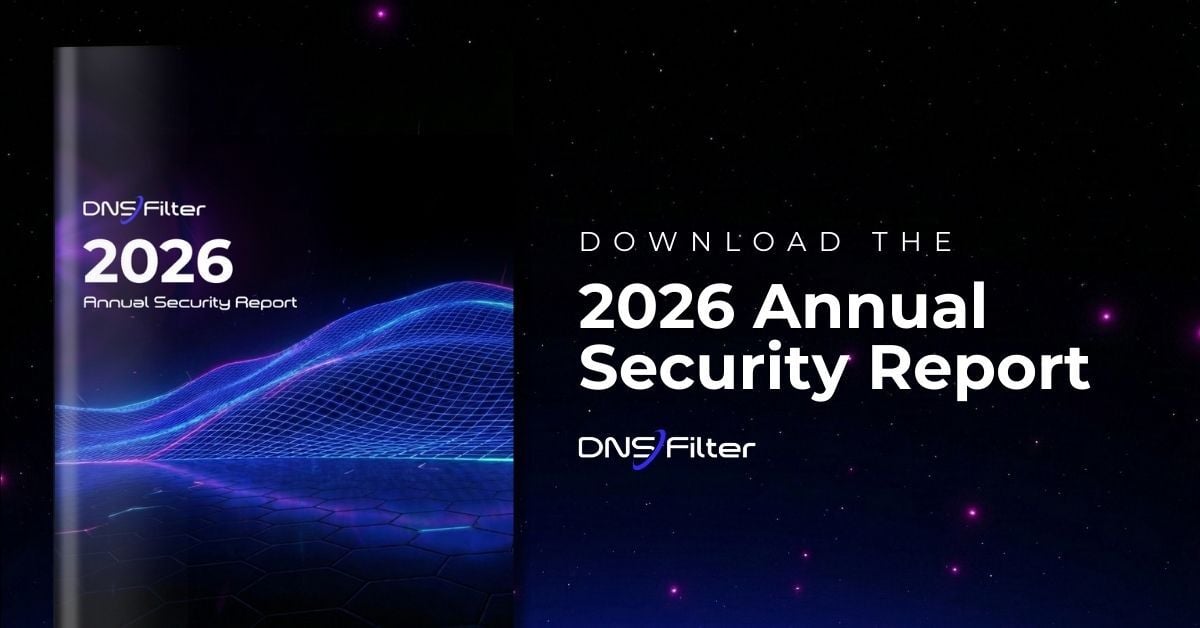AI-Based Startup DNSFilter Protects WFH Employees During COVID-19 with Innovative Software
by DNSFilter Team on Nov 29, 2020 12:00:00 AM
AI startup company DNSFilter provides a DNS security threat and content filtering solution for enterprises. Their industry-leading solution detects if a page contains malicious or inappropriate content in real-time. As companies have swiftly shifted to working from home and worldwide stay at home orders and lockdowns continue, many are looking for solutions that keep their employees safe while working online.
Disrupting the $2.7BN Content Filtering Market
According to a July 2020 market research report by ReportLinker, the Global Web Content Filtering market was initially estimated to reach $2.7 billion in the year 2020. With the global COVID-19 crisis continuing to spread, the market size is expected to reach $5.7 billion by 2027 growing at a CAGR of 11.5% over the next seven years.
DNSFilter Co-founder and CEO Ken Carnesi created the company from his frustrations with existing web filtering solutions. He recognized many of the options available were either overpriced, outdated, or simply ineffective. His solution? Create the fastest DNS solution on the market.
Increased Protection and Productivity
The global COVID-19 pandemic has brought more businesses online, which has also increased opportunities for cybersecurity threats. DNSFilter is backed by powerful artificial intelligence that can detect cyber threats and phishing attacks faster—offering an extra layer of security for operations shifting to remote systems.
Regarding the move to WFH, Carnesi said, "Since the start of the pandemic, we've seen the need for remote protection grow by nearly 300% on our network. Companies are looking for solutions that transition easily from traditional offices to work-from-home environments."
With DNSFilter, organizations can prevent access to unwanted and malicious content on all devices, both inside and outside their network. Some of the benefits include the ability to:
- Deny access to tasteless/adult content
- Keep employees on track by blocking time-wasters like YouTube & Netflix
- Protect off-site company devices from malicious domains
"At the start of the pandemic, phishing sites increased by 350%, and 55% of those sites mention coronavirus," said Carnesi regarding the increase in online attacks during the pandemic. "A lot of these sites are set up to mimic informational sites about coronavirus. Our Data Scientist trained our AI back in March since these threats were becoming so common. We were able to protect our users from threats while they began working remotely and were blocking them from receiving misinformation about COViD-19."
DNSFilter's global reach is trusted by brands and organizations, from small business owners to larger corporations. NVIDIA, a Fortune 500 company and leading manufacturer of computer GPUs, picked DNSFilter after a stress test revealed DNSFilter's AI engine's speed and accuracy.
Categories
 DNSFilter’s Annual Security Report Highlights 30% Increase in Threats
DNSFilter’s Annual Security Report Highlights 30% Increase in Threats
Users are encountering as many as 66 threats daily—and new domains are a top culprit
 DNSFilter Sets New Benchmark for CSAM Protection with 2025 Year-End Blocking Results
DNSFilter Sets New Benchmark for CSAM Protection with 2025 Year-End Blocking Results
Major year-over-year increase in CSAM detection and prevention highlights expanded safety innovation in the wake of explicit GenAI content
 DNSFilter Strengthens Leadership Ahead of 2026 with New Chief Revenue Officer Rich Scott
DNSFilter Strengthens Leadership Ahead of 2026 with New Chief Revenue Officer Rich Scott
WASHINGTON, D.C. – Dec. 2, 2025 – DNSFilter, a global leader in protective DNS and content filtering, announced today that Rich Scott has joined as Chief Revenue Officer (CRO.) Scott brings more than 19 years of sales and executive leadership experience, including multiple prior CRO roles, and a track record of driving high-impact revenue strategies across cybersecurity organizations.Scott most recently served as Chief Revenue Officer at Critical...


